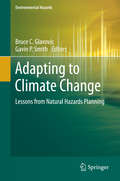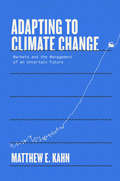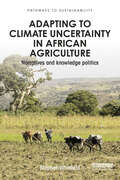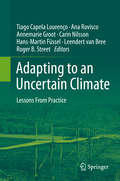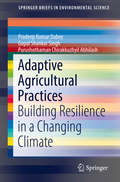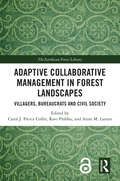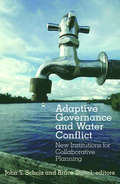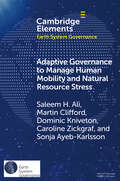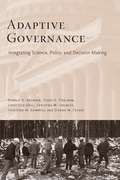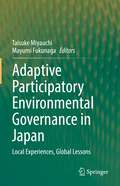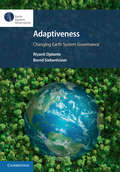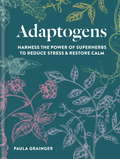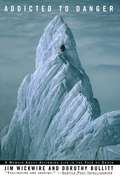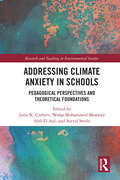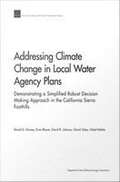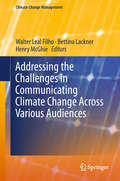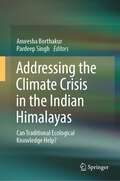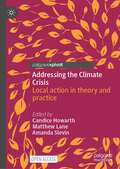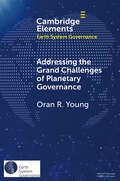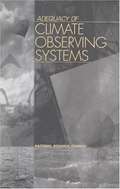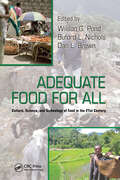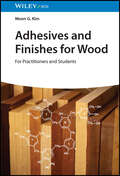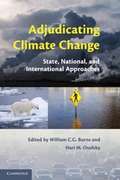- Table View
- List View
Adapting to Climate Change: Lessons from Natural Hazards Planning (Environmental Hazards)
by Bruce C. Glavovic Gavin P. SmithThis book identifies lessons learned from natural hazard experiences to help communities plan for and adapt to climate change. Written by leading experts, the case studies examine diverse experiences, from severe storms to sea-level related hazards, droughts, heat waves, wildfires, floods, earthquakes and tsunami, in North America, Europe, Australasia, Asia, Africa and Small Island Developing States. The lessons are grouped according to four imperatives: (i) Develop collaborative governance networks; (ii) build adaptive capabilities; (iii) invest in pre-event planning; and (iv) the moral imperative to undertake adaptive actions that advance resilience and sustainability. "A theoretically rich and empirically grounded analysis of the interface between disaster risk management and climate change adaptation, comprehensive yet accessible, and very timely. " Mark Pelling, Department of Geography, King's College London, UK. "This book represents a major contribution to the understanding of natural hazards planning as an urgent first step for reducing disaster risk and adapting to climate change to ensure sustainable and equitable development. " Sálvano Briceño, Vice-Chair, Science Committee, Integrated Research on Disaster Risk IRDR, an ICSU/ISSC/ISDR programme. Former Director International Strategy for Disaster Reduction, UNISDR. "What a welcome addition to the young literature on climate adaptation and hazard mitigation! Bruc e Glavovic and Gavin Smith each bring to the editing task a rare blend of solid scholarly attainment and on-the-ground experience that shines through in this extensively-documented synthesis of theoretical ideas from the realms of climate and hazards and their validation in a rich set of diverse case studies pulled in from around the world. This book should remain a classic for many years. " William H. Hooke, American Meteorological Society.
Adapting to Climate Change: Markets and the Management of an Uncertain Future
by Matthew E. KahnA revelatory study of how climate change will affect individual economic decisions, and the broad impact of those choicesSelected by Publishers Weekly as one of its Top Ten books in Business and Economics for Spring 2021 It is all but certain that the next century will be hotter than any we&’ve experienced before. Even if we get serious about fighting climate change, it&’s clear that we will need to adapt to the changes already underway in our environment. This book considers how individual economic choices in response to climate change will transform the larger economy. Using the tools of microeconomics, Matthew E. Kahn explores how decisions about where we live, how our food is grown, and where new business ventures choose to locate are impacted by climate change. Kahn suggests new ways that big data can be deployed to ease energy or water shortages to aid agricultural operations and proposes informed policy changes related to public infrastructure, disaster relief, and real estate to nudge land use, transportation options, and business development in the right direction.
Adapting to Climate Uncertainty in African Agriculture: Narratives and knowledge politics (Pathways to Sustainability)
by Stephen WhitfieldFuture climatic and agro-ecological changes in Africa are uncertain and associated with high degrees of spatial and temporal variability and this change is differently simulated within divergent climate-crop models and in controlled crop breeding stations. Furthermore, uncertainty emerges in local contexts, not just in response to climatic systems, but to social, economic, and political systems, and often with implications for the appropriateness and adoption of technologies or the success of alternative cropping systems. This book examines the challenges of adaptation in smallholder farming in Africa, analysing the social, economic, political and climatic uncertainties that impact on agriculture in the region and the range of solutions proposed. Drawing on case studies of genetically modified crops, conservation agriculture, and other 'climate smart' solutions in eastern and southern Africa, the book identifies how uncertainties are framed 'from above' as well experienced 'from below', by farmers themselves. It provides a compelling insight into why ideas about adaptation emerge, from whom, and with what implications. This book offers a unique perspective and will be highly relevant to students of climate change adaptation, food security and poverty alleviation, as well as policy-makers and field practitioners in international development and agronomy.
Adapting to an Uncertain Climate: Lessons From Practice
by Tiago Capela Lourenço Ana Rovisco Annemarie Groot Carin Nilsson Hans-Martin Füssel Leendert Bree Roger B. StreetClimate change highlights the challenges for long-term policy making in the face of persistent and irreducible levels of uncertainties. It calls for the development of flexible approaches, innovative governance and other elements that contribute to effective and adaptive decision-making. Exploring these new approaches is also a challenge for those involved in climate research and development of adaptation policy. The book provides a dozen real-life examples of adaptation decision making in the form of case studies: · Water supply management in Portugal, England and Wales and Hungary · Flooding, including flood risk in Ireland, coastal flooding and erosion in Southwest France, and flood management in Australia's Hutt River region · Transport and utilities, including the Austrian Federal railway system, public transit in Dresden, and Québec hydro-electric power · Report examining communication of large numbers of climate scenarios in Dutch climate adaptation workshops.
Adaptive Agricultural Practices: Building Resilience in a Changing Climate (SpringerBriefs in Environmental Science)
by Pradeep Kumar Dubey Gopal Shankar Singh Purushothaman Chirakkuzhyil AbhilashThis brief explores several adaptive agricultural practices from around the world to fulfill current and future agricultural demands for food security due to the challenges posed by climate change and growing global population. Readers will discover how farmers adapt to environmental changes by adopting various agronomic practices at crop, farm and landscape levels. Particular attention is given to systemic and transformational adaptation strategies employed by farmers such as mulching, organic farming and crop diversification. This is a highly informative and carefully presented book that provides insights on how crops can build up resilience against periods of drought, high salinity, disasters such as floods, and diseases. The policy implications and future prospects of these adaptation strategies are also addressed. Environmental and plant scientists, agronomists and researchers in climate sciences will find this book interesting.
Adaptive Collaborative Management in Forest Landscapes: Villagers, Bureaucrats and Civil Society (The Earthscan Forest Library)
by Carol J. Pierce Colfer, Ravi Prabhu, and Anne M. LarsonThis book examines the value of Adaptive Collaborative Management for facilitating learning and collaboration with local communities and beyond, utilising detailed studies of forest landscapes and communities. Many forest management proposals are based on top-down strategies, such as the Million Tree Initiatives, Forest Landscape Restoration (FLR) and REDD+, often neglecting local communities. In the context of the climate crisis, it is imperative that local peoples and communities are an integral part of all decisions relating to resource management. Rather than being seen as beneficiaries or people to be safeguarded, they should be seen as full partners, and Adaptive Collaborative Management is an approach which priorities the rights and roles of communities alongside the need to address the environmental crisis. The volume presents detailed case studies and real life examples from across the globe, promoting and prioritizing the voices of women and scholars and practitioners from the Global South who are often under-represented. Providing concrete examples of ways that a bottom-up approach can function to enhance development sustainably, via its practitioners and far beyond the locale in which they initially worked, this volume demonstrates the lasting utility of approaches like Adaptive Collaborative Management that emphasize local control, inclusiveness and local creativity in management. This book will be of great interest to students, scholars and practitioners working in the fields of conservation, forest management, community development and natural resource management and development studies more broadly.
Adaptive Governance and Water Conflict: New Institutions for Collaborative Planning
by John T. Scholz Bruce StiftelWater policy seems in perpetual crisis. Increasingly, conflicts extend beyond the statutory authority, competence, geographical jurisdictions, and political constituencies of highly specialized governing authorities. While other books address specific policy approaches or the application of adaptive management strategies to specific problems, this is the first book to focus more broadly on adaptive governance, or the evolution of new institutions that attempt to resolve conflicts among competing authorities. Adaptive Governance and Water Conflict investigates new types of water conflicts among users in the seemingly water-rich Eastern United States. Eight case studies of water quality, water quantity, and habitat preservation or restoration in Florida were chosen to span the range of conflicts crossing fragmented regulatory boundaries. Each begins with a history of the conflict and then focuses on the innovative institutional arrangements - some successful, some not - that evolved to grapple with the resulting challenges. In the chapters that follow, scholars and practitioners in urban planning, political science, engineering, law, policy, administration, and geology offer different theoretical and experience-based perspectives on the cases. Together, they discuss five challenges that new institutions must overcome to develop sustainable solutions for water users: Who is to be involved in the policy process? How are they to interact? How is science to be used? How are users and the public to be made aware? How can solutions be made efficient and equitable? In its diverse perspectives and unique combination of theory, application, and analysis, Adaptive Governance and Water Conflict will be a valuable book for water professionals, policy scientists, students, and scholars in natural resource planning and management.
Adaptive Governance to Manage Human Mobility and Natural Resource Stress (Elements in Earth System Governance)
by Saleem H. Ali Caroline Zickgraf Martin Clifford Dominic Kniveton Sonja Ayeb-KarlssonConnections between resources and migration operate as a complex adaptive system rather than being premised in linear, causal mechanisms. The systems thinking advocated within this Element increases the inclusion of socio-psychological, financial, demographic, environmental and political dimensions that mediate resource-(im)mobility pathways. The Earth Systems Governance paradigm provides a way to manage global migration flows more effectively, allowing for consideration of networks and interdependencies in addition to its inherent adaptiveness. Resource rushes, hydropower displacement, and climate-induced retreat from coastal areas are all examples of circumstances linking resources and human mobility. Movement can also ameliorate environmental conditions and hence close monitoring of impacts and policies which harness benefits of migration is advocated. Green remittance bonds, and land tenure policies favoring better arable resource usage are key ingredients of a more systems-oriented approach to managing mobility. The Global Compact on Migration offers an opportunity to operationalize such adaptive governance approaches in the Anthropocene.
Adaptive Governance: Integrating Science, Policy, and Decision Making
by Ronald Brunner Toddi Steelman Lindy Coe-Juell Christina Cromley Christine Edwards Donna TuckerDrawing on five detailed case studies from the American West, the authors explore and clarify how to expedite a transition toward adaptive governance and break the gridlock in natural resource policymaking. Unlike scientific management, which relies on science as the foundation for policies made through a central bureaucratic authority, adaptive governance integrates various types of knowledge and organizations. Adaptive governance relies on open decision-making processes recognizing multiple interests, community-based initiatives, and an integrative science in addition to traditional science. Case studies discussed include a program to protect endangered fish in the Colorado River with the active participation of water developers and environmentalists; a district ranger's innovative plan to manage national forestland in northern New Mexico; and how community-based forestry groups are affecting legislative change in Washington, D.C.
Adaptive Participatory Environmental Governance in Japan: Local Experiences, Global Lessons
by Taisuke Miyauchi Mayumi FukunagaThis book contributes to the theoretical and practitioner literature in environmental governance and sustainability of natural resources by linking case studies of the roles of narratives to the three key practices in local environmental governance: socio-political legitimacy in participation; collaboratively creating stakeholder-ness, and cultivating social and ecological capabilities. It provides numerous theoretical insights on legitimacy, adaptability, narratives, process-oriented collaborative planning, and among others, using in-depth case studies from historical and contemporary environmental issues including conservation, wildlife management, nuclear and tsunami disasters, and thus community risk, recovery, and resiliency. The authors are all practitioner-oriented scientists and scholars who are involved as local stakeholders in these practices. The chapters highlight their action and participatory-action research that adds deeper insights and analyses to successes, failures, and struggles in how narratives contribute to these three dimensions of effective environmental governance. It also shows how stakeholders’ kinds of expertise, in a historical context, help to bridge expert and citizen legitimacy, as well as spatial and jurisdictional governance structures across scales of socio-political governanceOf particular interest, both within Japan and beyond, the book shares with readers how to design and manage practical governance methods with narratives. The detailed design methods include co-imagination of historical and current SESs, designing processes for collaborative productions of knowledge and perceptions, legitimacy and stakeholder-ness, contextualization of contested experiences among actors, and the creation of evaluation standards of what is effective and effective local environmental governance.The case studies and their findings reflect particular local contexts in Japan, but our experiences of multiple natural disasters, high economic growth and development, pollutions, the nuclear power plant accident, and rapidly aging society provide shared contexts of realities and provisional insights to other societies, especially to Asian societies.
Adaptiveness: Changing Earth System Governance
by Bernd Siebenhüner Riyanti DjalanteRapid and transformational actions are ever more urgently needed to achieve a just, resilient, and ecologically sustainable global society, as envisioned and supported by the Sustainable Development Goals. Moreover, dynamic governance approaches are vital for addressing changing and uncertain conditions. At many levels, governance needs to be responsive and flexible - in one word - adaptive. This book provides a state-of-the-art review of the conceptual development of adaptiveness as a key concept in the environmental governance literature, complemented by applications from global, regional, and national levels. It reviews the politics of adaptiveness, investigates which governance processes foster adaptiveness, and discusses how, when and why adaptiveness influences earth system governance. It is a timely synthesis for students, researchers and practitioners interested in environmental governance, sustainability and social change processes. This is one of a series of publications associated with the Earth System Governance Project. For more publications, see www.cambridge.org/earth-system-governance.
Adaptogens: Harness the power of superherbs to reduce stress & restore calm
by Paula GraingerIncreasing numbers of people are suffering from stress, anxiety and fatigue caused by lack of sleep, digital overload and our 24/7 lifestyle. In Adaptogens, Medical Herbalist Paula Grainger provides an answer to this modern-day affliction by introducing us to the group of powerful herbal ingredients known as adaptogens..Adaptogens, such as Ashwagandha, Maca, Korean ginseng, Turmeric, Reishi mushrooms, Liquorice, Rosemary and Rhodiola, have been scientifically proven to lower levels of the stress hormone cortisol and prevent adrenal imbalances that can lead to adrenal fatigue and 'burn-out'. Delve into the history and science of these miraculous plants and learn how to maximize wellness using the most easy-to-source adaptogens, incorporating them into your life via delicious smoothies, energy bites and desserts, invigorating teas, tonics and lattes, and wonderful beauty elixirs.
Adaptogens: Harness the power of superherbs to reduce stress & restore calm
by Paula GraingerIncreasing numbers of people are suffering from stress, anxiety and fatigue caused by lack of sleep, digital overload and our 24/7 lifestyle. In Adaptogens, Medical Herbalist Paula Grainger provides an answer to this modern-day affliction by introducing us to the group of powerful herbal ingredients known as adaptogens..Adaptogens, such as Ashwagandha, Maca, Korean ginseng, Turmeric, Reishi mushrooms, Liquorice, Rosemary and Rhodiola, have been scientifically proven to lower levels of the stress hormone cortisol and prevent adrenal imbalances that can lead to adrenal fatigue and 'burn-out'. Delve into the history and science of these miraculous plants and learn how to maximize wellness using the most easy-to-source adaptogens, incorporating them into your life via delicious smoothies, energy bites and desserts, invigorating teas, tonics and lattes, and wonderful beauty elixirs.
Addicted to Danger: Affirming Life in the Face of Death
by Jim Wickwire Dorothy BullittAdventurist Jim Wickwire has lived life on the edge -- literally. An eyewitness to glory, terror, and tragedy above 20,000 feet, he has braved bitter cold, blinding storms, and avalanches to become what the Los Angeles Times calls "one of America's most extraordinary and accomplished high-altitude mountaineers." Although his incredible exploits have inspired a feature on 60 Minutes, an award-winning PBS documentary, a Broadway play, and a full-length film, he hasn't told his remarkable story in his own words -- until now.Among the world's most intrepid and fearless climbers, Jim Wickwire has traveled the globe, from Alaska to the Alps, from the Andes to the Himalayas, in search of fresh challenges and new heights to conquer. Along the way he accumulated an extraordinary roster of historic achievements. He was one of the first two Americans to reach the summit of the 28,250-foot K2, the world's second highest peak, acknowledged as the toughest and most dangerous to climb. He completed the first alpine-style ascent of Alaska's forbidding Mt. McKinley, spending several nights without tents in snowcaves, crevasses, and open bivouacs. But with the triumphs came harrowing incidents of suffering and loss that haunt him still. On one climb, his shoulder broken by a fall, he watched helplessly as a friend slowly froze to death, trapped in an ice crevasse. Buffeted by storms, Wickwire spent two weeks utterly alone on a remote glacier before his rescue. On two other expeditions he witnessed three fellow climbers plunge thousands of feet, vanishing into the mountain mist.A successful Seattle attorney, Wickwire climbed his first mountain in 1960 and discovered the wonder of leaving behind the complexities of the civilized world for the pure life-and-death logic of granite, glacier, and snow. Deeply compelled by the allure of nature and the thrill of risk, he pushed himself to the limits of physical and mental endurance for thirty-five years, ultimately climbing into legend.After more than three decades of uncommon challenges, Wickwire faced a crisis of heart -- a turning point that threatened his faith in himself and his hope in the future. How he reassessed his priorities and rededicated his life -- to his family and to his community -- completes a unique and moving portrait of one man's courage, commitment , and grace under pressure. Addicted to Danger is a tale of adventure in its truest sense.
Addressing Climate Anxiety in Schools: Pedagogical Perspectives and Theoretical Foundations (Research and Teaching in Environmental Studies)
by Julie K. Corkett Astrid Steele Wafaa Mohammed Moawad Abd-El-AalThis monograph presents a contemporary examination of climate anxiety within schools. Featuring contributions from experts across Canada, Austria, Australia, New Zealand, the United Kingdom, Italy, and Finland, the book underscores the prevalence of climate anxiety, a phenomenon often overlooked in discussions about climate change and education. The monograph is divided into two sections. The first section begins by outlining how climate anxiety manifests in schools, examining the theoretical underpinnings of climate change education and its psychological impact on students and teachers. The second section presents innovative and practical strategies for mitigating climate anxiety in the classroom, highlighting the importance of cohesive learning environments and cross-curricular approaches. Readers will benefit from the book’s international perspective and its blend of theory and practice, gaining valuable insights into how to address climate anxiety and foster resilience in educational contexts.An international, empirical, and ethnographic evidence-based perspective of climate anxiety in classroom, this book will appeal to scholars, researchers, postgraduate students, and educators with interests in climate change education, sustainability education, policy and administration, mental health, and pedagogy.
Addressing Climate Change in Local Water Agency Plans: Demonstrating a Simplified Robust Decision Making Approach in the California Sierra Foothills
by David G. Groves Evan Bloom David R. Johnson David Yates Vishal MehtaThis report describes an approach for planning under deep uncertainty, Robust Decision Making (RDM), and demonstrates its use by the El Dorado Irrigation District (EID). Using RDM, the authors and EID tested the robustness of current long-term water management plans and more robust alternatives across more than 50 futures reflecting different assumptions about future climate, urban growth, and the availability of important new supplies.
Addressing the Challenges in Communicating Climate Change Across Various Audiences (Climate Change Management)
by Walter Leal Filho Henry McGhie Bettina LacknerThis book offers a concrete contribution towards a better understanding of climate change communication. It ultimately helps to catalyse the sort of cross-sectoral action needed to address the phenomenon of climate change and its many consequences. There is a perceived need to foster a better understanding of what climate change is, and to identify approaches, processes, methods and tools which may help to better communicate it. There is also a need for successful examples showing how communication can take place across society and stakeholders. Addressing the challenges in communicating to various audiences and providing a platform for reflections, it showcases lessons learnt from research, field projects and best practices in various settings in various different countries. The acquired knowledge can be adapted and applied to other situations.
Addressing the Climate Crisis in the Indian Himalayas: Can Traditional Ecological Knowledge Help?
by Pardeep Singh Anwesha BorthakurThis book focuses on the traditional ecological knowledge in addressing the current climate crisis in the Indian Himalayas. Local or indigenous people in the Himalayas, through their low-carbon producing lifestyles, contribute very little to the climate crisis. However, at the same time, they bear the brunt of this crisis way more than many others. It is important to learn about their traditional ways of life and the knowledge that they hold regarding ecology and environment. Traditional ecological knowledge and associated belief systems are given increasing attention across the globe in recent times toward addressing some of the grave environmental concerns. Climate change is one such concern. The rising consideration of concepts such as ethnoecology and ethnobotany signifies the scientific, socio-cultural and economic potential of the traditional ecological knowledge systems. It is indisputable that these knowledge systems have the ability to provide important insights towards tackling many present-day environmental distresses including several climate change challenges. In this book, the authors concentrate on such traditional ecological knowledge systems in the Indian Himalayan region and try to figure out their significance in relation to the modern science. Overall, the authors attempt to write a book where the relevance of traditional ecological knowledge systems could be addressed and communicated to a larger audience—both academic scientific and non-academic.
Addressing the Climate Crisis: Local action in theory and practice
by Amanda Slevin Matthew Lane Candice HowarthThis open access book brings together a collection of cutting-edge insights into how action can and is already being taken against climate change at multiple levels of our societies, amidst growing calls for transformative and inclusive climate action. In an era of increasing recognition regarding climate and ecological breakdown, this book offers hope, inspiration and analyses for multi-level climate action, spanning varied communities, places, spaces, agents and disciplines, demonstrating how the energy and dynamism of local scales are a powerful resource in turning the tide. Interconnected yet conceptually distinct, the book’s three sections span multiple levels of analysis, interrogating diverse perspectives and practices inherent to the vivid tapestry of climate action emerging locally, nationally and internationally. Delivered in collaboration with the UK’s ‘Place-Based Climate Action Network’, chapters are drawn from a wide range of authors with varying backgrounds spread across academia, policy and practice.
Addressing the Grand Challenges of Planetary Governance: The Future of the Global Political Order (Elements in Earth System Governance)
by Oran R. YoungThe world today confronts unprecedented needs for governance having profound implications for human well-being that are difficult - perhaps impossible - to address effectively within the prevailing global political order. This makes it pertinent to ask whether we must assume that the global order will continue during the foreseeable future to take the form of a state-based society as we think about options for addressing these challenges. Treating political orders as complex systems and drawing on our understanding of the dynamics of such systems, the author explores the prospects for a critical transition in the prevailing global political order. Individual sections analyze constitutive pressures, systemic forces, tipping elements, the effects of scale, the defining characteristics of potential successors to the current order, and pathways to a new order. In the process, seeking to make a more general contribution to our understanding of critical transitions in large political orders.
Addressing the Natural Resource Curse: An Illustration from Nigeria
by Arvind Subramanian Xavier Sala-i-MartinNigerian natural resource management.
Adequacy of Climate Observing Systems
by Panel on Climate Observing Systems StatusThe National Academies Press (NAP)--publisher for the National Academies--publishes more than 200 books a year offering the most authoritative views, definitive information, and groundbreaking recommendations on a wide range of topics in science, engineering, and health. Our books are unique in that they are authored by the nation's leading experts in every scientific field.
Adequate Food for All: Culture, Science, and Technology of Food in the 21st Century
by Wilson G. Pond Buford L. Nichols Dan L. BrownFood is the sustenance of life. But while we understand that a secure supply of food has been affected by many factors over the course of history, we do not often allow ourselves to entertain the idea that a lack of adequate food worldwide is a very real and dangerous possibility. While soil degradation, water distribution, climate change, populati
Adhesives and Finishes for Wood: For Practitioners and Students
by Moon G. KimAdhesives and Finishes for Wood Understand the science of joining wood with this comprehensive guide Long seen as an old-fashioned material with narrowing modern applications, wood has seen increased popularity as a material in building and manufacturing in recent years. This has been driven by the need for sustainable resources and environmentally friendly materials. As a result of increased emphasis on wood, however, there is a corresponding need to understand the wood adhesives, the crucial materials in wood-based manufacture and craftsmanship. Adhesives and Finishes for Wood meets this need with a comprehensive but accessible introduction to the chemistry and applications of wood adhesives. Its easy-to-follow presentation nonetheless presents wood adhesives and finishes in significant detail. Ideal for readers without considerable preexisting knowledge in chemistry, this book includes everything the reader needs to understand and apply wood adhesives in their work or industry. Adhesives and Finishes for Wood readers will also find: Coverage ranging from the fundamentals of wood adhesive polymer chemistry to the properties of specific wood structures and resins A presentation suitable for both academic students and wood manufacture professionals An author with decades of experience in both academia and industry Adhesives and Finishes for Wood is a useful reference for advanced students and professionals in industries or manufacturing disciplines that incorporate wood, as well as for chemists, materials scientists, vocational school instructors, and more.
Adjudicating Climate Change: State, National, and International Approaches
by William C. G. Burns Hari M. OsofskyCourts have emerged as a crucial battleground in efforts to regulate climate change. Over the past several years, tribunals at every level of government around the world have seen claims regarding greenhouse gas emissions and impacts. These cases rely on diverse legal theories, but all focus on government regulation of climate change or the actions of major corporate emitters. This book explores climate actions in state and national courts, as well as international tribunals, in order to explain their regulatory significance. It demonstrates the role that these cases play in broader debates over climate policy and argues that they serve as an important force in pressuring governments and emitters to address this crucial problem. As law firms and public interest organizations increasingly develop climate practice areas, the book serves as a crucial resource for practitioners, policymakers, and academics.
